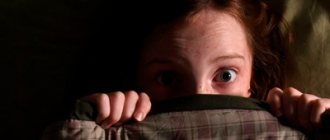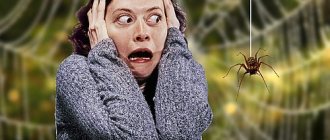Social phobia - how to get rid of it yourself, when is it possible and how? In what cases can you not do without the professional help of a psychotherapist? What are the main psychotherapeutic methods effective in treating social phobia? We asked Chief Medical Officer Vladislav Sipovich, a practicing psychiatrist, psychiatrist-narcologist and psychotherapist, to answer these questions.
What are phobias
The concept of "phobia" comes from the Greek "phybos". This is a mental disorder associated with uncontrollable fear of certain situations or objects. Most often, the factors causing the disorder include insects, people, animals, darkness, etc.
Finding oneself in the same space as an object of fear causes increased anxiety or a panic attack in a person. In this case, the pathology is accompanied by a variety of painful symptoms. In severe cases, the patient is overcome by such strong fear that he can harm himself or others.
Get rid of fear, anxiety or phobia forever. Is it possible to?
FearAnxietyPhobia
Today we will talk about another large group of psychological problems that require the help of a professional psychologist or psychotherapist - namely, fears and phobias, as well as anxiety . I will tell you what it is, why it occurs, what therapy is possible and what the prognosis is.
What are fear and anxiety?
Firstly, fears and phobias are not the same thing. Fear - in terms of physiological processes in the body, it is similar to anxiety: it is the response of the central nervous system to threat and danger. This response of the nervous system is presented both in the form of body reactions (sweating, increased heart rate, muscle tension, nausea, trembling, etc.) and in the form of emotions (actually fear, anxiety, horror, panic, disgust, etc. .), as well as in the form of certain thoughts (“we must run”).
A very specific object for the appearance of fear: a dog
Fear is caused by a certain , very specific object or situation that is threatening or dangerous. And if there is no object, but fear is present - that is, a feeling something like “it’s unclear what bad thing will happen” - this is anxiety, or a state of an uncertain threat or danger. Everyone has different levels of personal anxiety - some are more relaxed, others are more tense all the time. I have already written about the difference between anxiety and anxiety.
When the brain evaluates something as threatening, it stimulates the autonomic nervous system, which also causes the heart to beat faster, the adrenal glands to release corticosteroid hormones into the blood, etc., which is felt as anxiety or fear. When the threat has passed, the brain once again activates the autonomic nervous system so that it restores normal order in the body.
But sometimes, for certain reasons, the brain incorrectly perceives a threat or danger, namely, it perceives it when it actually does not exist . But the brain still keeps the autonomic system active, and the person still experiences severe anxiety. And so all the time. This is how anxiety disorder .
People usually describe their condition like this: “I can’t do anything. I worry about everything all the time. I'm constantly worried that something will happen. I find it difficult to concentrate, and everything falls out of my hands. Even at work, I constantly worry that this condition will cause me to make mistakes and get fired. Because of this, I can’t concentrate on what I’m doing at all.”
In psychodynamic psychotherapy (psychoanalysis, etc.), it is assumed that anxiety disorder occurs when the defense mechanisms of the psyche cannot withstand stress and are overwhelmed by neurotic and moral anxiety, as well as when the existing defense mechanisms are weak to adequately withstand stress. We all come from childhood, so psychotherapists who support the psychodynamic model will look for the causes of an anxiety disorder somewhere in your childhood, for example, in the child-parent relationship, in overprotection, in punishment or excessive patronage of parents, etc.
Cognitive behavioral therapy is based on the premise that anxiety disorders are triggered by dysfunctional, maladaptive assumptions or beliefs, such as “It is imperative that everyone respects me” or “It is terrible when things don’t go the way we would like.” When a person encounters in life a large number of facts and situations that contradict his basic irrational attitudes, and the influence of these attitudes extends to more and more areas of his life, an anxiety disorder may develop.
A cognitive behavioral therapist will focus on working on maladaptive beliefs and learning to cope with stress.
For example, a psychologist will teach you how to keep a diary of thoughts, feelings, and behavior, and can teach you a technique called “Stress Vaccination,” which helps increase self-confidence in dealing with stress. In addition, some time will be devoted to learning to cope with situations of uncertainty that make clients with anxiety disorders very fearful. Due to the fact that uncertainty is disturbing, the predictability of the outcome decreases, which, in turn, as a vicious circle, causes an increase in anxiety.
In addition to psychotherapeutic methods, your doctor may prescribe anti-anxiety medications.
Specific phobias: fear of heights, darkness, closed spaces (claustrophobia), fear of flying (aerophobia), etc.
But if the brain “chose and now prefers” a certain object as a threat and danger, for example, flying on an airplane, or spiders, or darkness, then a person may develop a specific phobia .
Fear of people and social situations, public speaking is called social phobia , fear of appearing in public places is called agoraphobia . There will be a separate story about them, because these two types of phobias are a little separate.
This, of course, is normal if you are afraid of something, for example, the dark or flying on an airplane. How do you know if you have a phobia or a natural fear of a dangerous object? A phobia is a strong and persistent experience and causes such stress that it affects personal, social or professional life. A person begins to avoid situations in which he may encounter a feared object. But some objects are difficult to avoid, so if you encounter them, a person experiences severe fear or panic. By the way, there are also panic disorders , which are often accompanied by agoraphobia - there will also be a separate discussion about them.
So, if because of your fears your personal, professional or social life is in any way disrupted, changed, if you understand that your fears are excessive, then it is a phobia. If, by and large, you just like to talk with someone on the topic “oh, how afraid I am of spiders, I probably have real arachnophobia, this is some kind of horror!”, and at the same time this does not affect your life in any sense affects - it's not a phobia.
Most people never turn to a psychologist for advice about their fears - because it seems easier to them to avoid frightening objects. Sometimes phobias go away on their own (especially if they started in childhood). But if the phobia began in adulthood, it will most likely persist and decrease only as a result of psychotherapeutic or drug treatment.
However, sometimes life turns out in such a way that you cannot avoid the object of your phobia. For example, you have aerophobia (fear of flying), and you need to pursue a career where you can’t do without regular business trips. What then? Then the choice remains: either quit your career or engage in aerophobia.
The second is more beneficial because cognitive behavioral therapy for specific phobias shows relatively rapid success rates of up to 95% of cases. At the moment, the most widely used and highly effective method for combating phobias is the exposure method .
What are the types of phobias?
- poverty
- pregnancy
- wind
- water
- air
- heights
- homosexuality
- robbers
- thunderstorms
- rain
- animals
- mirrors
- snake
- walk across the bridge
- needles
- skin diseases
- blood
- dolls
- horses
- mechanisms
- furs
- microbes
- graves
- mice
- meat
- nights
- fire
- spiders
- flights
- ghosts
- birds
- empty premises
- wounds and injuries
- speed
- snow
- dogs
- darkness
- crowds
- injections
- churches
- worms
- noise
- poison
- and anything else
Exposure treatment for phobias
There are many varieties of this method, but at the moment it is the most effective and most effective for the treatment of specific phobias. Of course, provided that it is carried out by a professional psychotherapist and the client has the motivation to get rid of the phobia.
The essence of the method comes down to the fact that the client is “exposed” to the influence of the object that he is afraid of, but exposed in a special way, under careful control and discussion of what is happening:
- gradually, from the least terrible to the most terrible;
- constantly monitoring the client’s condition and discussing with him what is happening, what he feels, etc.;
- the client’s conscious refusal to avoid avoidance tendencies, avoid fears and discuss them, the desire to overcome fear;
- the psychotherapist also participates in the procedure as a model;
- in parallel, cognitive-behavioral influence is carried out on dysfunctional beliefs and training (coaching) of the client in methods of normal handling of the object of fear;
- the effect continues until the level of fear and anxiety reaches a maximum, after which it levels off for a while, and then immediately drops dramatically. At the next stage, the level of fear no longer reaches such a height. The point is that you need to consciously, under control, knowing ways to help, “endure” this impact several times - and most importantly, do not quit in the middle, because this “feeds” the phobia! - after which almost everyone experiences significant relief from the symptoms of the phobia.
According to research by the author of the OST (one-session treatment for specific phobias) method, Swedish psychiatrist L.G. Ost and his followers, such an approach to the treatment of specific phobias leads to a drop in the level of fear and anxiety in one three-hour session to at least 50%, and usually almost to zero. In the future, the client needs several supporting sessions, and, of course, the most important thing is the practice of the client himself in real life.
Other treatments for specific phobias
In addition to the exposure method and its variations, other methods are currently used to treat phobias, such as desensitization, flooding and modeling.
In all of these methods, as well as in exposure, the client will confront the object of their fear (because this is the most effective way to get rid of it). In the first case, with desensitization, the client is taught to relax simultaneously with the appearance of situations or objects that frighten them. Since simultaneous relaxation and fear are physiologically incompatible, it is believed that the fear response will be reduced.
During a flood, the presentation of frightening objects or situations does not occur gradually, and also without relaxation exercises. The client is taught to cope with fear immediately, without any special training.
In the case of using the modeling method, the therapist acts as a “guinea pig”, and the client observes the actions, reactions and state of the therapist from the outside. Subsequently, the client joins the therapist. Modeling is also partially used in the exposure method, as one of the components.
Summarizing all approaches to professional psychological assistance for anxiety or phobias, we can say that the most effective method of assistance is a controlled encounter between a person and the object of fear.
Provided by SendPulse
Types of phobias
The disease is of two types - primary or secondary. The first category includes fears associated with one object or a specific situation. Secondary pathology is characterized by the addition of other disorders. For example, if a person is only afraid of spiders, this is a primary species. If, over time, a second, third and subsequent phobias appear, we can already talk about a secondary pathology.
In total, there are about 40 thousand phobias in the world, so it is impossible to consider everything within the scope of this article. The table shows the main types of violations that occur most often.
| Name of pathology | What Causes Fear |
| Acrophobia | Height |
| Claustrophobia | Closed space |
| Ophiphobia | Snakes |
| Aviation phobia | Flying on an airplane |
| Hematophobia | Blood |
| Agoraphobia | Large open space |
| Keraunophobia | Lightning |
| Entomophobia | Insects |
| Social phobia | Society (people around) |
| Pyrophobia | Fire |
| Eremophobia | Loneliness |
| Arachnophobia | Spiders |
| Gerascophobia | Aging |
| Dentophobia | Dental procedures |
| Kinophobia | Dogs |
| Hypochondria | Diseases |
| Ligrophobia | Darkness |
| Mechanophobia | Motor transport |
| Musophobia | Mice |
| Nosocomephobia | Medical institutions |
Symptoms of phobias and their diagnosis
Symptoms directly depend on the type of disease. If a person is afraid of snakes, then when he gets into the same space with the “aggressor factor,” panic may begin. The same goes for other types of phobias. There are also common symptoms that unite all types of pathology. These include:
- Difficulty swallowing and a feeling of a “lump” in the throat.
- Dry mouth.
- Frequent urge to urinate.
- Diarrhea.
- Cardiopalmus.
- Breathing problems, shortness of breath
- Pain in the chest area.
- Dizziness, nausea.
- Noise in ears.
- Deterioration of vision.
- Trembling in limbs.
- Impaired concentration.
- Memory impairment.
- Increased sensitivity to noise.
- Excessive worry.
- Cramps.
- Pre-fainting state.
- A sharp increase in blood pressure.
Often the disease is accompanied by depression, depression and an obsession that something will happen soon.
The concept of phobia - how to distinguish a phobia from other anxiety disorders
A phobia is essentially a hypertrophied, excessive fear. The signs of a phobia are quite distinguishable. To understand the difference between a phobia and ordinary fear, it is important to evaluate the phobic stimulus (what exactly the person is afraid of). If it is ordinary fear, the person usually does not spend much time thinking about its cause, fear arises mainly during an actual encounter with a frightening object (for example, when a person is actually lifted to a height), can be controlled and does not interfere with the implementation of plans to a significant extent. In the case of a phobia, fear will occupy a person’s thoughts for a longer time, signs of a phobia will appear in the absence of a phobic stimulus (cause) and, of course, will affect the person’s quality of life.
What can you do yourself?
You cannot take medications uncontrollably, but you can try to cope with fears through self-affirmation. The methods in this case will be as follows:
- Eliminate stressful situations as much as possible. In this case, going out into nature with loved ones will help. If your fears are related to work or others, it won’t hurt to take a vacation to give your nervous system a rest.
- Don't try to fight obsessive thoughts. The longer a person tries to fight fears, the worse it gets, as panic attacks begin to appear more and more often. It’s better to take it for granted and accept that it’s just a character trait and not a disease.
- Write down and analyze intrusive thoughts. This will help you understand that not everything is as scary as it seems. After all, many people encounter the factors of your fears every day, but nothing bad happens. Simply put, try to convince yourself that “they live with it, so I can do it too!”
- Take soothing baths more often. This will help you relax, get distracted and calm down. If there are no contraindications, you can add tincture of valerian or motherwort to the bath, as well as aromatic oils - lavender, pine needles, cedar, ylang-ylang, citrus, mint, bergamot.
- Conduct morning auto-trainings. To do this, you need to go to the mirror or simply repeat a few phrases over a cup of mint tea - “I’m not afraid,” “I will succeed,” “I’m a strong person,” “I feel happy.”
In addition, playing sports, yoga, relaxing music and even watching funny children's cartoons help.
Are you tired of fighting a phobia? Come to us and we will definitely help
Phobia Treatment Clinic “Solution”
Treatment should be carried out by experienced specialists with extensive experience. With improper therapy, the patient's condition rapidly deteriorates. Doctors at the Reshenie clinic have been treating complex diseases, including phobias, for 18 years. Methods are selected individually after making an accurate diagnosis. Effective proprietary methods and a competent approach to the problem allow you to quickly eliminate pathologies and save patients from painful attacks. If you need treatment for depression and phobias, trust your health only to certified doctors.
Signs of a phobia
A person suffering from a phobia can quite normally lead a normal life, without standing out from others. The disease may in no way affect mental activity, family life and career growth. All problems in this case begin at the moment of contact with a phobic stimulus, the cause of the phobia. In this case, a person instantly loses control over himself, and fear does not respond to any influence of rational thinking and logic. The main signs of phobias:
- - chills;
- - sweating of the extremities;
- - tachycardia (rapid heartbeat);
- - suffocation;
- - darkening of the eyes;
- - state of horror.
Contact a specialist
Sign up for a consultation tel. 242-82-65
Make an appointment
Yuri Lvovich Muchnik
Psychiatrist-narcologist
Doctor of the highest category. 35 years of experience. Works at the Clinic named after. prof. F.F. Preobrazhensky since 2001
How we work with patients
Treatment at the Reshenie clinic is based on eliminating symptoms and the disorder itself. Main stages of therapy:
- Introductory sessions with the patient, where doctors provide complete information about the disease and answer all questions.
- If, in addition to phobias, the patient has symptoms similar to other pathologies, a consultation with highly specialized specialists is prescribed.
- Work to correct the patient's behavior. At this stage, doctors tell you how to cope with fear and control emotions.
- Other techniques, depending on the person’s condition, are hypnosis, physiotherapy, psychotherapy.
It is worth noting that the result depends both on the correctness of the selected technique and on the patient himself. If a person does not interact with specialists, treatment may be delayed. To quickly get rid of the disease, it is important to follow all the doctor’s recommendations and not miss sessions.
How to cope with dental phobia?
There are several techniques that help, if not completely rid a person of dental phobia, then at least forget about its most striking manifestations. Methods for correcting dental phobia in children, adolescents and adults are medicinal and psychotherapeutic:
- drug treatment. The basic medicine for correcting severe dental phobia is an antidepressant. The drug helps overcome nervousness and panic, normalizes the production of seratonin in the body. Immediately before starting therapy, the doctor may recommend taking sedatives and natural drugs that demonstrate a calming effect;
- psychotherapy. This approach to the treatment of dental phobia is based on identifying the causes of the disorder and overcoming the fear by the person himself. The main role in therapy is given to the psychologist, who finds an individual approach to the patient and identifies tools that will help the person get rid of fear. The technique allows you to look at the problem differently and prepare for a trip to the dentist in advance.
It doesn’t matter what form of illness we are talking about in a particular case, the main thing is to normalize the person’s emotional state. To reduce the feeling of anxiety, there are many recipes in the arsenal of folk remedies.
The most effective plants that allow you to restore mental strength include:
- chamomile;
- lavender;
- St. John's wort;
- mint;
- oregano;
- valerian.
Decoctions of these herbs can be drunk instead of tea. However, it is worth considering that herbal remedies have a cumulative effect. The decoctions should be taken as a treatment course 10-14 days before the planned visit to the doctor.
Recommendations from a psychologist
How to overcome fear as an adult?
In order for treatment or tooth extraction to be successful, a person with dental phobia should study and begin to put into practice effective advice from a psychologist that works for various phobias:
- give yourself permission to be afraid. Attempts to “kill fear inside yourself” will sooner or later manifest themselves in an enhanced reaction of the nervous system. It would be much more correct to admit that there is fear, and this is normal. Only after accepting the feeling of fear will it be easier to control it.
- realize that it won't hurt. If you are very worried, you should talk to your doctor and talk about your experiences. The doctor will immediately apply an anesthetic gel or spray and only then introduce anesthesia;
- Name for yourself the consequences of refusing systematic visits to the dentist. Think about what delay is fraught with for you: deterioration in health, appearance and large-scale financial costs in the future;
- Choose your own clinic where you are going to have your tooth treated or pulled out. In addition to searching online, try visiting a few dentists in person. Evaluate the atmosphere in the clinic, compliance with sanitary standards, equipment of rooms, etc.;
- make an appointment for an initial medical consultation. At your first visit to the doctor, tell him about your problem, decide for yourself the issue of trust in the specialist. A good doctor will be tactful, patient, willing to answer your questions and treat the current situation with understanding. An experienced dentist will help dispel some of the fears and reduce the degree of anxiety;
- Prepare for treatment in advance. Do not neglect the doctor’s advice on nutrition, daily routine, check the appointment time the day before, and do not forget to ask about the duration of therapy;
- take a sedative. During your initial consultation, your doctor will likely recommend that you take sedatives the night before your procedure. Don't ignore this advice;
- replace the brain with action. If a panic attack begins to overcome you in the dentist's chair, forcefully occupy your anxious brain with solving some logical puzzle or repeating obsessive song lines.
One of the most effective ways to help you calm down before visiting a doctor is breathing practice. Our breathing quickens when we are excited and becomes smooth when we are relaxed and calm. The opposite effect also works: try breathing rhythmically, deeply, and feel how your nervous system calms down. The most popular techniques are belly breathing, counting and heart rhythm. You can master them with a psychotherapist.
Treatment methods for phobias
Several methods are used to eliminate pathology - psychotherapy, drug treatment, hypnosis, treatment using virtual reality, physiotherapy, and the NLP method (neurolinguistic programming). The latter implies a special technique “symptom, cause, result, resources and effect.” The second name of the method is rapid treatment of phobias. We use modern techniques and work for results, so we try to use medications only in the most extreme cases.
FAQ
What is the difference between fear and phobia?
Fear is a normal protective reaction of the body to a dangerous situation. After the fear factor is eliminated, the condition returns to normal, and the symptoms no longer return. If an uncontrollable feeling of fear occurs regularly without any known reason, this means that the person has a phobia.
Is phobia an incurable pathology?
The disease responds well to therapeutic measures; the main thing is to approach this issue correctly and competently. Treatment methods are selected depending on the severity of the pathology, symptoms and the cause that caused it. The effectiveness of therapy in this case directly depends on the patient’s desire to get rid of the phobia.
Is it possible to cure the disease on your own?
It is better to consult a doctor, as improper treatment will only make the disease worse. An experienced psychotherapist works using modern methods and knows which one is best to apply in a given situation.
Is it possible to die from a phobia?
Despite the fact that there is an expression “I almost died of fear,” cases of death are practically excluded. There are situations when, in a state of panic, a person loses self-control and can harm himself. This phenomenon is very dangerous and leads to serious consequences, including death. This is why you should not self-medicate. It is better to contact a psychotherapist as soon as possible.
Is it possible to get rid of a phobia that has been haunting you for several years?
It doesn’t matter how many years a person suffers from a phobia - the disease can be treated at any time. For this, there are special techniques that relieve the patient from panic attacks once and for all.
Healing by provocation
Our fears can be treated, sometimes unexpectedly quickly.
What about phobias? This uncontrollable emotional overreaction only occurs in certain situations, just as an allergy becomes an immune overreaction in response to exposure to a specific allergen. To free yourself from such dependence, you need to artificially induce a sudden fear reflex: consciously put yourself in frightening situations, getting used to them and gradually increasing the impact of provoking factors.
This technique is similar to the treatment of allergies: there is a gradual adaptation to the allergen and at the same time a decrease in sensitivity to it. For example, in order to stop being afraid of pigeons, you must first get used to the image of these birds in the photo, then accustom yourself to look at a pigeon in a cage, and then approach a flock of pigeons in a park...
The goal of psychotherapy is not liberation from phobia, but the introduction of fear into a natural framework: it must become adequate and controllable. Often those who suffer from some kind of phobia begin to “fear the fear itself.” And “getting used to fear” exercises combined with relaxation techniques help you learn to accept it as inevitable. By ceasing to be afraid of your fear, you can begin to treat it more calmly - understand, react, overcome.
Reviews about the treatment of phobias
Maria, 32 years old. Astrakhan. “Since childhood, I was very afraid of heights and could not even go near the windows in the apartment. Although we live on the second floor. For a long time I tried to cope with the disease on my own, but nothing worked. After another unsuccessful attempt to pull myself together, I decided to go to the clinic. I can say that I have no regrets at all. In fact, everything turned out to be simpler than I thought. Several sessions of psychotherapy and hypnosis helped eliminate the disease and look at life in a new way.”
Mikhail, 42 years old. Moscow city. “I tried a bunch of ways to treat claustrophobia at home. All this is not the same. Apart from a doctor, nothing will help. I visited our local clinic. 15 sessions were enough to get rid of the disease forever. So it is better not to self-medicate and not to put off going to a specialist for too long. Only a psychotherapist can quickly relieve depression and phobias.”
Arina, 27 years old. Bryansk. “For 5 years I suffered from terrible panic attacks. To be honest, I even had thoughts of suicide. I once found a message from a girl on a forum, where she described the same situation as mine and recommended that I see a psychotherapist. The treatment wasn’t as quick as it turned out, but I’m happy with the result.”
How to overcome social phobia on your own?
If a person suffers from monophobia, then there is a high probability that he will be able to cope with it on his own. But consulting a psychologist or psychotherapist obviously wouldn’t hurt. A specialist will be able to give recommendations taking into account your type of nervous system, the main channel of information perception, specific life circumstances and the severity of symptoms. Of course, I can give some practical advice on how to get rid of social phobia on your own, but I still insist on the need for preliminary consultation. So, first of all, a person with manifestations of social phobia must change his way of thinking: • Completely get rid of negativity towards himself. • Firmly understand that he has something to say and offer to others. • Realize the pointlessness and futility of avoiding the company of other people, and also that they are not monsters and they have something to do other than discuss your qualities and actions. • Convince yourself of your purposefulness and the significance of your own thoughts and actions. You can achieve these results and learn to think positively if you think about it for 10-30 minutes every day.
In addition, if you do not want to seek advice from a psychotherapist, you can find on the Internet people with similar problems who have successfully coped with social phobia. Find out how they managed to do this, and try to find for yourself the most positive and acceptable solution on how to overcome social anxiety in yourself. Positive thoughts are followed by the next stage - getting rid of fear. After all, no matter how positively you set yourself up, anxiety and fear, a feeling of discomfort and awkwardness when communicating with other people still remain. This is what you should do: • At the first sign of panic, start breathing deeply, do not make sudden movements and do not convince yourself that you are not afraid. Violently denying fear can only make it worse. Just try to fix your attention on something else, for example, the rhythm of your breathing. Do not avoid situations that frighten you, even carefully meet them halfway and each time accept the challenge of your own phobias. Believe me, only those who fight win. • You should not start with sudden attempts to immediately plunge fully into your fear; start small and gradually. For example, if you are afraid of crowds, then you should not immediately mix with a large number of people - just stand at a distance and watch what is happening. Then you can start asking questions to strangers, for example, what time is it, how to get somewhere, etc. Subsequently, you can try to talk to a person of the opposite sex. • Establishing business connections and contacts will be the next step in the fight against fear. Make purchases yourself, ask other buyers for their opinions about the product, contact sellers and managers for advice, and in transport, feel free to warn about your stop, and do not wait for someone to demand it before you. Be moderately active in such situations and over time the fear will become less and less. • Try not to depend only on the opinions of others, increase your self-esteem, trust your opinion and intuition. Hear your inner voice and then those around you will hear you. To overcome feelings of insecurity and become convincing to yourself and others, do the following exercises: • Developing beautiful speech by reading poetry aloud. • Coming up and presenting speeches for yourself on any topic. • Tell yourself about the past day's activities and the weather. • Training on close communication skills. • You can even try pantomime in front of a mirror, showing with signs what you want. This will make you feel more relaxed and eliminate the fear of looking ridiculous and funny. And yet, you always need to be internally prepared for communication, for the fact that someone wants to ask you about something or find out your opinion on a certain problem. To avoid getting into an awkward position, first understand the essence of the question and then answer. Understand that your opinion is really important to others if they are interested in it. To summarize, I can give a rough plan on how to treat social phobia yourself: • Recognize your problem, do not deny it and do not put off solving it until later. • Change your lifestyle, get active in a good and careful way, stay alone less and try to go out “in public.” • Don't forget about the above training. • Develop a sense of humor, be able to laugh at yourself and your fears. After all, nothing bad happened because they made fun of you or laughed at you. Remember the old Jewish joke: “It’s not scary when they laugh at you, but when they cry at you.” • Do not use doping in the form of alcohol, much less soft drugs, to increase sociability. • Do not accumulate resentment and do not hold grudges. Rancor and hatred are bad advisers in establishing communication with other people and are destructive to the psyche. If all your attempts have not brought significant results, seek professional help from a psychotherapist who will competently assess the depth of your problem and prescribe adequate psychotherapeutic and, if necessary, medication treatment.











